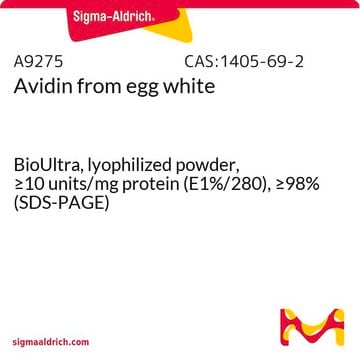About This Item
Recommended Products
Assay
≥97% (TLC)
form
powder
solubility
DMSO: ≤20 mg/mL
storage temp.
2-8°C
SMILES string
[H][C@]12CS[C@@H](CCCCC(=O)NN)[C@@]1([H])NC(=O)N2
InChI
1S/C10H18N4O2S/c11-14-8(15)4-2-1-3-7-9-6(5-17-7)12-10(16)13-9/h6-7,9H,1-5,11H2,(H,14,15)(H2,12,13,16)/t6-,7-,9-/m0/s1
InChI key
KOZWHQPRAOJMBN-ZKWXMUAHSA-N
Looking for similar products? Visit Product Comparison Guide
General description
Application
- the modification of alginate
- for the labelling of mitochondrial proteins from non-muscle tissues
- as a component of glycoprotein staining solution
- in periodic acid-biotin-hydrazide (PABH) assay for mucins
- for labeling surface functional groups, biologically active molecules such as antibodies, lectins, sugars, nucleic acids or molecules with free carboxylic or keto groups.
- for coupling to glycoproteins through the carbohydrate by hydrazone formation
Disclaimer
related product
Storage Class Code
11 - Combustible Solids
WGK
WGK 3
Flash Point(F)
Not applicable
Flash Point(C)
Not applicable
Personal Protective Equipment
Certificates of Analysis (COA)
Search for Certificates of Analysis (COA) by entering the products Lot/Batch Number. Lot and Batch Numbers can be found on a product’s label following the words ‘Lot’ or ‘Batch’.
Already Own This Product?
Find documentation for the products that you have recently purchased in the Document Library.
Customers Also Viewed
Our team of scientists has experience in all areas of research including Life Science, Material Science, Chemical Synthesis, Chromatography, Analytical and many others.
Contact Technical Service







